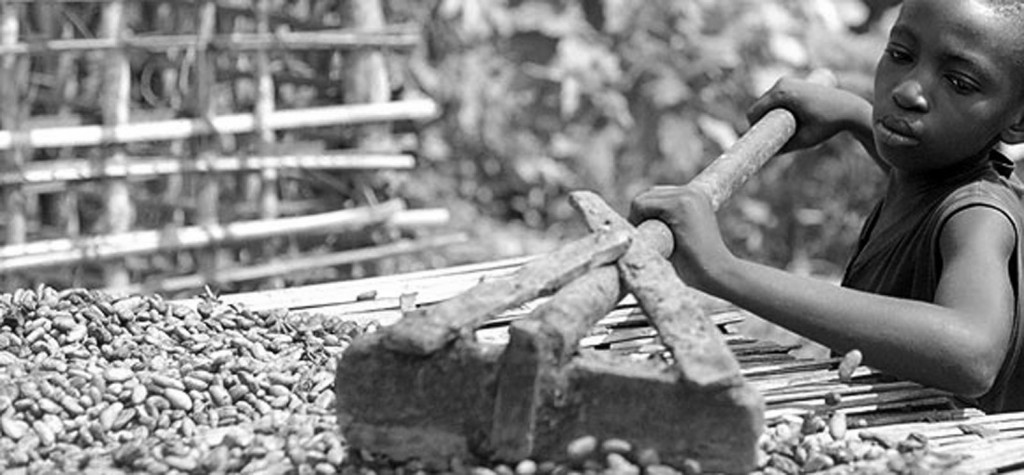“There’s something that is really unsavory and horrible about companies, and the people that run those companies, being able to be so wealthy at the top of the supply chain. But at the bottom you see a level of exploitation that is almost unmatched. Still, the chocolate industry is transforming, and a good portion of that transformation is due to consumer pressure.” – Sean Rudolph, Campaigns Director, International Labour Rights Forum
70% of the cocoa exported worldwide comes from West Africa, primarily from Ghana and Cote D’Ivoire. More than 109,000 children in Cote d’Ivoire’s cocoa industry work in what the US Department of State calls one of the worst forms of child labour. 10,000 are estimated to be victims of human trafficking or enslavement.
They often work in precarious environments, using dangerous tools, to the detriment of a their access to education and in conditions that perpetuate slavery.
Their families may be dependent on their income, so the use of child labour may be difficult to completely eradicate. But the worst forms of child labour, which children in emotional and physical harm, are the ones that are being targeted.
There is a growing awareness of child labour in the cocoa industry. This has transformed into global activism, as people confront chocolate companies directly. But can individuals influence large companies? I asked this of several activists: Elizabeth O’Connell, the Campaigns Director of Green America, an environmental and social justice NGO, Amanda Kloer, the Campaigns Director of Change.org, the largest online petition website, and Sean Rudolph, the Campaigns Director of the International Labour Rights Forum (ILRF), an NGO specializing in labour advocacy issues.
I also sought the business perspective, and contacted: Lucía Abdala, a spokesperson for Nestlé in Switzerland, and
Richard Buino, a spokesperson for Mondelēz (formerly Kraft Foods) in Illinois, two of the world’s largest chocolate companies (I also contacted Hershey, which did not provide comment). Both the activists and the business representatives said that consumer campaigns can be very effective.
“The more people you can get to write and express their concern, the more progress you will see,” campaigner O’Connell said.
The Nestlé spokesperson agrees, saying that companies do pay attention to consumer concerns about how their products are made.“Consumers are in the center of our activities. Consumers’ expectations regarding our role in society and the environment are higher than ever, and our goal is to engage efficiently with them and understand and listen to their needs.”
“Companies like Mondelēz do record all the complaints and concerns they receive, and respond” Buino said.
Using different actions and approaches
The ILRF, Green America, and Change.org are involved in the “Raise the Bar” initiative to push Hershey to adopt fair trade standards for its chocolate.
The Raise the Bar initiative uses several campaign tactics:
- Starting or signing online petitions that target chocolate companies that may be lagging in terms of commitment or who have not yet made any commitments
- Emailing company CEOs personally and explaining who you are and what changes you want see
In-store demonstrations and protests - Writing op-eds to local newspapers to raise awareness on the issue
- Putting signs up in local grocery stores
- Speaking to the media about the issue – often people who start petitions are contacted by media spokespersons to get even more coverage on the issue
Diversifying action is important, Kloer says. “The campaigns that we’ve seen consumers run that have been the most effective have combined petitions on Change.org with other tactics to get decision-makers attention and to make sure that they know what their customers want.”
O’Connell agreed with the importance of diverse approaches to campaigning. “It keeps companies on their toes,” she said. “It leads to the companies becoming completely overwhelmed and being forced to take action.”
Companies do listen to consumers’ demands, Lucía Abdala of Nestlé says. “We have teams dedicated to communicating with consumers across all contact points: phone, e-mail, web pages, social media and so on.”
Numbers have an impact
Morgan Rayner was an unhappy Ferrero and Lindt customer in Australia who felt that the two companies had not properly acknowledged the issue of child labour. She initiated a petition on Change.org that received more than 100,000 signatures. This led to Ferrero and Lindt promising to fully certify their chocolate by 2020.
“Mondelēz studies consumer insights and trends,”Buino says. “And as consumers vote with their pocketbooks, so will the company offer the product with a sustainability advantage to win a consumer’s business.”
Last year, for example, a consumer campaign pushed Whole Foods Market into removing the specialty Hershey chocolates Dagoba and Sharffenberger from its stores.
Hershey has since promised to fully certify its chocolate by 2020.
Raising awareness
Consumers have their share of responsibility in eradicating the worst forms of child labour in the chocolate industry, Rudolph says. To successfully alleviate child labour, they need to have an understanding of the problem. “Knowing what the issue is and what type of chocolate you’re buying is the first step.”
O’Connell agrees that knowing about the problems with chocolate, and whether the company producing it has made any efforts to improve conditions for farmers and workers, is a good start.“We are working to create a really informed consumer base that can work with us to pressure companies to be more involved,” she said.
Some companies have made more efforts than others, the activists say, and single out Hershey for doing less than other major companies.
The activists also consider that national governments have their share of responsibility for the child labour issue, but consumer-based activities have been mainly directed at chocolate companies.
There are about ten major companies who form an oligopoly that control the supply chain of chocolate and wield a majority of the power in terms of changes that can realistically be made.
Candy Industry publishes an annual list of the top 100 global confectionery companies, ranking them by net sales. (Source: International Cocoa Organization)
The table below is an extract from this list, giving the top ten global confectionery companies that manufacture some form of chocolate, by net confectionery sales value in 2012:
| Company Net Sales 2012 | (US$ millions) |
|---|---|
| Mars Inc (USA) | 16,800 |
| Mondelēz International Inc (USA) | 15,480 |
| Barcel SA, division of Grupo Bimbo (Mexico) | 14,095* |
| Nestlé SA (Switzerland) | 12,808 |
| Meiji Co Ltd (Japan) | 12,428* |
| Hershey Foods Corp (USA) | 6,460 |
| Ferrero Group (Italy) | 5,627 |
| Chocoladenfabriken Lindt & Sprüngli AG (Switzerland) | 2,791 |
| August Storck KG (Germany) | 2,272 |
| Yildiz Holding (Turkey) | 2,200 |
How effective has consumer-based advocacy been?
Richard Buino says that Mondelēz has committed at least $400 million over 10 years to social improvements. “Our new signature program – Cocoa Life – plans to improve the livelihoods and living conditions of more than 200,000 cocoa farmers and about one million people in cocoa farming communities in Côte d’Ivoire, Ghana, India, Indonesia, Dominican Republic and Brazil,” he says.
Lucia Abdala of Nestlé says that it is the first food company to partner with Fair labour Association. “We want to address potential cases of non-compliance with our commitments. Since November 2011, Nestlé has been working with Fair Labour Association to investigate whether children are working on cocoa farms in West Africa that supply our factories.”
Examples of companies that have made changes include:
- Mars. In 2009 was one of the first companies to make the promise to certify its chocolate as ethically sourced and not the product of slave labour by 2020.
- Cadbury. Made some of its products Fair Trade in 2009, following consumer-based pressure campaigns involving online petitions and letters addressed to their CEOS.
- Ferrero and Lindt. In 2012 promised to certify its chocolate following the Morgan Rayner petition on Change.org
- Hershey. In 2012 matched the Mars commitment to certify its chocolate by 2020.
Looking ahead
Although many chocolate companies have made the promise to certify their chocolate, there is still a question of how far will they really go with certification and what will it entail.
There are concerns amongst campaigners that Hershey in particular will not go far enough to address the issue, and the company has not responded to requests for clarification about what its standards will be.
Because of these uncertainties, campaigners continue to ask that companies adopt full Fair Trade certification standards, which they see as the only serious guarantee that products are produced ethically and sustainably.
Amanda Kloer of Green America says companies can afford to move more quickly to adopt Fair Trade standards. “When you compare what the workers make, and their standard of living, to the amount of money that the major international companies bring in, it’s appalling and embarrassing. That’s why these campaigns matter.”



